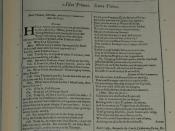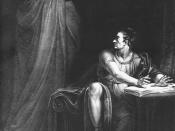The play Julius Caesar by William Shakespeare details the death of Caesar but more thoroughly shows the demise and emotional battles of Brutus. Brutus's belief that Caesar's death would benefit the common good, his long soliloquies showing his anxiety before the assassination, his mental downfall following the death of Caesar as well as his suicide at the end of the play all show Shakespeare's portrayal of Brutus being the tragic character, contrary to the title.
To begin with, Brutus's belief that Caesar's death would benefit the general public and preserve the democratic society of the Roman Empire was a leading factor in Brutus' consequent demise. But apart from this, Brutus claims he had no other reason to as much as lay a finger on Caesar: "... I know no personal cause to spurn at him, but for the general..." (Line 11/12 Act II Scene I) This is the beginning of Brutus' anxieties and this fact is taken advantage of Cassius, who, believing that Brutus will help in their conspiracies sends letters and the like to convince Brutus to join: "...take
this paper, and look you lay it in the praetor's chair..." (Line 142 and 143 Act I Scene III) Eventually, though, Brutus is completely convinced that killing Caesar is a good thing though despite this still endlessly worries about the outcomes.
Furthermore, an evident sign of Brutus' anxiety leading to his suicide are his long and emotional soliloquies in Act II Scene I. These soliloquies show many things, the most important being his internal debate as to whether or not he should conspire against Caesar. His speeches also look at the main reason he wants to kill his dear friend, Caesar - that is, his over ambitious nature. He uses the metaphor of a ladder to portray ambition: "... that...


